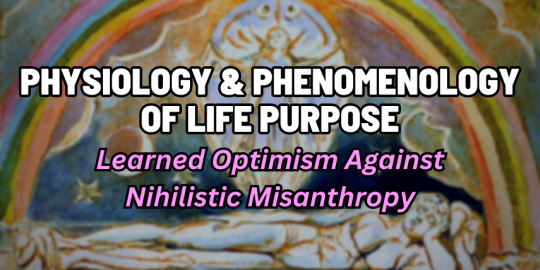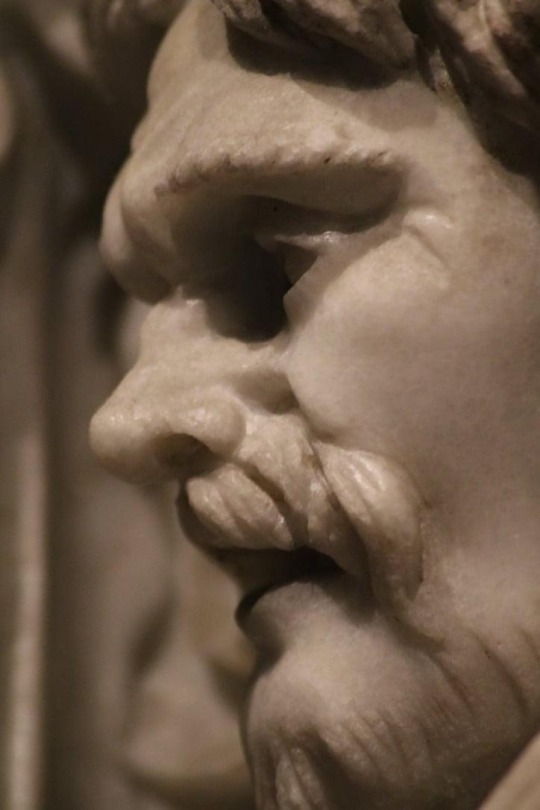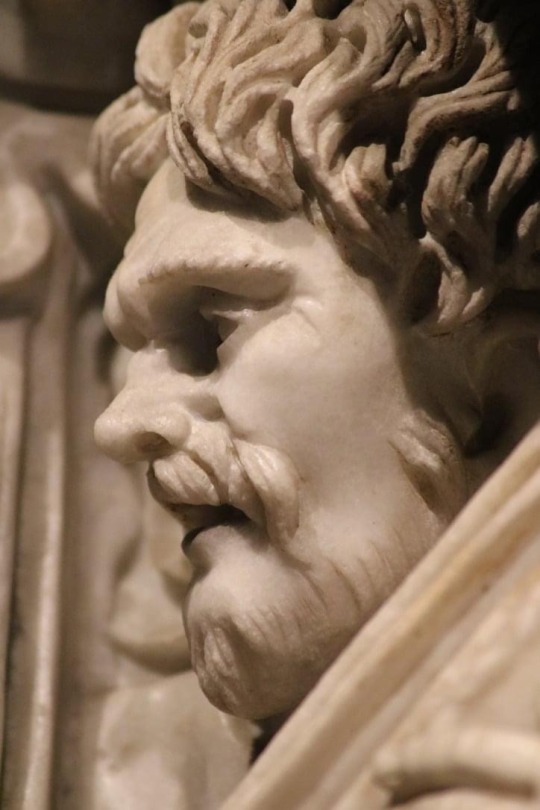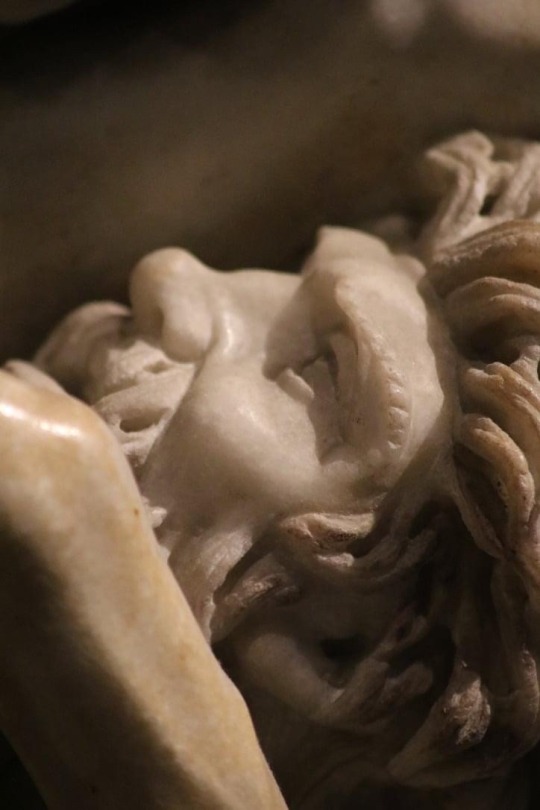#johann georg hamann
Text
Language is the center of reason’s misunderstanding with itself.
Johann Georg Hamann, Writing on Philosophy and Language (2007, 211)
0 notes
Text
Physiology & Phenomenology of Life Purpose: Learned Optimism Against Misanthropic Nihilism
“…either an accommodation reached, in some kind of dignity, with the Angel of Death, or only death and the daily, tedious preparations for it. Another mode of meaning behind the obvious, or none.”—Thomas Pynchon, The Crying of Lot 49
Today, inquiring into life’s possible meanings, one might ask the priest, a parent, or ChatGPT, with varying dissatisfaction. Is it possible for us to deduce…

View On WordPress
#albion#alzheimers#alzheimers disease#byung chul han#christianity#consciousness#cytokines#endotoxin#epistemology#henri bergson#inflammation#intuition#johann george hamann#jordan peterson#jungian psychology#language#linguistics#logo daedalus#marxism#materialism#metaphysics#mitochondria#nihilism#ontology#poetry#positivism#process philosophy#process theology#Psychology#psychotherapy
1 note
·
View note
Text



La chiarezza è una giusta distribuzione di luce e ombra. (Johann Georg Hamann)
#foto mie#fotografia#fotoblog#fotografía original#fotoshooting#my photos#photography#beautiful photos#fotodeldia#photo edit#frasi tristi#frasi vita#frasi e citazioni#frasi famose#frasi italiane#frasi libri#photogram#photoshoot#frasi belle#frasi canzoni#fotoarte#fotocommunity#foto#fotos#fotografando#fotografo#foto mia#mis fotos#my photography#photografy
5 notes
·
View notes
Text
0 notes
Text
Fideism (from the Latin "fides" or "faith") is the view that religious belief depends on faith or revelation, rather than reason, intellect or natural theology. In this respect it is in direct opposition to the doctrine of Deism. More accurately it objects to evidentialism, the notion that no belief should be held unless it is supported by evidence. As a result, it holds that theology may include logical contradictions without apology. It may or may not also involve active disparagement of the claims of reason.
Fideism teaches that rational or scientific arguments for the existence of God (see the section on Philosophy of Religion) are fallacious and irrelevant, and have nothing to do with the truth of Christian theology because Christian theology teaches that people are saved by faith in the Christian God (i.e. trust in the empirically unprovable) and if the Christian God's existence can be proven, either empirically or logically, then to that extent faith becomes unnecessary or irrelevant. Therefore, if Christian theology is true, no immediate proof of the Christian God's existence is possible.
Support for Fideism
Support for fideism is most commonly associated, inter alia, with four major philosophers: Blaise Pascal, Søren Kierkegaard, William James, and Ludwig Wittgenstein:
Tertullian (160 - 235), a Roman early Christian, is often credited with early fideist tendencies by virtue of his statement "the Son of God died; it is by all means to be believed, because it is absurd", although it is likely that he was engaging in ironic overstatement here, and his main point was that if a person in whom you have trust tells you about a miraculous event he witnessed, you can allow yourself to consider that he may be saying the truth despite the fact that the event is very unlikely.
Pascal's formulation commonly known as Pascal's Wager is a type of fideism in which he invites atheists to see faith in God as a cost-free choice that carries a potential reward. It can be stated as follows: If we believe in God, then if he exists we will receive an infinite reward in heaven, while if he does not then we have lost little or nothing. Conversely, if we do not believe in God, then if he exists we will receive an infinite punishment in hell, while if he does not then we will have gained little or nothing. "Either receiving an infinite reward in heaven or losing little or nothing" is clearly preferable to "either receiving an infinite punishment in hell or gaining little or nothing", so it is rational to believe in God, even if there is no evidence that he exists.
Johann Georg Hamann (1730 - 1788), considered to be the father of modern irrationalism, built on the work of David Hume to argue that everything people do is ultimately based on faith. He maintained that without faith in the existence of an external world (for it can never be proven), human affairs could not continue, so all reasoning actually comes from this faith and it is fundamental to the human condition.
Kierkegaard's Christian Existentialism probed into the problem of faith in general, particularly focusing on the story of Abraham's willingness to sacrifice Isaac, and the incarnation of Christ. He ultimately affirmed that to believe in God made flesh was to believe in the "absolute paradox", since it implies that an eternal, perfect being would become a simple human. Reason cannot possibly comprehend such a phenomenon, so one can only believe in it by taking a "leap of faith".
James established a set of conditions under which, he argued, it is reasonable to believe in the absence of proof. He termed this a "genuine option", which he concluded must be "live", "forced" and "momentous". Unlike Pascal, James claimed that religious belief may not be more rational than Atheism or Agnosticism, but it is at least not less rational. He further argued that when it comes to religion we cannot avoid taking sides and incurring risks, and it is not enough to just avoid error.
Wittgenstein formulated his own Wittgensteinian Fideism which holds that religion is a self-contained, and primarily expressive, enterprise, governed by its own internal logic or “grammar”. He pointed out that religion is logically cut off from other aspects of life; that religious discourse is essentially self-referential and does not allow us to talk about reality; that religious beliefs can be understood only by religious believers; and that religion cannot be criticized.
Presuppositional Apologists hold that all human thought must begin with the proposition that the revelation contained in the Bible is axiomatic (self-evident and not to be proved or demonstrated) or one would not be able to make sense of any human experience. They further claim that all people actually believe in God, whether they admit or deny it.
Criticism of Fideism
Fideism has received criticism not just from atheists, but also from theologians who argue that fideism is not a proper way to worship God.
As sin:
The French Scholastic Peter Abelard, the Medieval Muslim philosopher Al-Ghazali and the Deist Lord Herbert of Cherbury have all argued that if one does not attempt to understand what one believes, one is not really believing: “blind faith” is not true faith at all.
As dangerous:
Individuals who unquestioningly obey irrational personal beliefs can be dangerous, and destructive or disruptive belief systems (e.g. cults, violent religious extremism) may result.
As relativism:
Relativism is the situation where two opposing positions are both true. If faith is the only way to know the truth of God, how are we to know which God to have faith in? Thus, the major monotheistic religions become on par with obscure fringe religions, as neither can be advocated or disputed.
As unreasonable:
We have effectively used reason in our daily lives to solve problems and to progressively increase our knowledge, and there is no evidence that a religious faith that rejects reason would also serve us while seeking truth. In addition, fideism does not help in situations in which our reason is not sufficient to find the truth (e.g. when trying to answer a particularly difficult mathematical question).
0 notes
Text
Birthdays 8.27
Beer Birthdays
Fred Bowman (1944)
Five Favorite Birthdays
Barbara Bach; actor (1947)
C.S. Forester; English writer (1899)
Georg Wilhelm Friedrich Hegel; German philosopher (1770)
Tarzan of the Apes; fictional character (1912)
Jeanette Winterson; English writer (1959)
Famous Birthdays
Patrick J. Adams; Canadian actor (1981)
Andreas Alföldi; Hungarian archaeologist and historian (1895)
Fernest Arceneaux; singer and accordion player (1940)
G.W. Bailey; actor (1944)
Gordon Bashford; English engineer, Range Rover co-creator (1916)
Tim Bogert; singer and bass player (1944)
Carl Bosch; German chemist (1874)
"Downtown" Julie Brown; V.J. (1959)
Sarah Chalke; actor (1976)
Alice Coltrane; pianist and composer (1937)
Jeff Cook; singer-songwriter and guitarist (1949)
Audrey C. Delsanti; French astronomer and biologist (1976)
Daryl "The Captain" Dragon; pop singer, songwriter (1942)
Theodore Dreiser; writer (1871)
Charles Fleischer; comedian and actor (1950)
Tom Ford; fashion designer (1961)
Chuck Girard; singer-songwriter and pianist (1943)
Samuel Goldwyn; film producer (1882)
Jeff Grubb; game designer and author (1957)
Johann Georg Hamann; German philosopher (1730)
Lyndon Baines Johnson; 36th U.S. President (1908)
Tony Kanal; British-American bass player and songwriter (1970)
Tom Lanoye; Belgian author, poet, and playwright (1958)
Ira Levin; writer (1929)
Alex Lifeson; Canadian singer-songwriter and guitarist (1953)
Norah Lofts; English author (1904)
Glen Matlock; English singer-songwriter and bass player (1956)
Katharine McCormick; biologist (1875)
John Mehler; drummer (1948)
Kenji Miyazawa; Japanese author and poet (1896)
Ann Murray; Irish soprano (1949)
Giuseppe Peano; Italian mathematician and philosopher (1858)
Kim Petras; German singer-songwriter (1992)
Jimmy Pop; singer-songwriter and guitarist (1972)
Norman Foster Ramsey Jr.; physicist (1915)
Man Ray; photographer, artist (1890)
Martha Ray; actor (1916)
Harry Reems; porn actor (1947)
Paul "Pee-Wee Herman" Reubens; actor, comedian (1952)
Robert Richardson; cinematographer (1955)
Tommy Sands; pop singer (1937)
Diana Scarwid; actress (1955)
Sonny Sharrock; guitarist (1940)
Reece Shearsmith; English actor, comedian and writer (1969)
Léon Theremin, Russian physicist, engineer, Theremin inventor (1896)
Kay Walsh; English actress and dancer (1911)
Tuesday Weld; actor (1943)
Chandra Wilson; actress (1969)
Lester Young; saxophonist and clarinet player (1909)
0 notes
Quote
Poetry is the mother-tongue of the human race.
Johann Georg Hamann
22 notes
·
View notes
Text




"Poetry is the mother-tongue of human race."
— Johann Georg Hamann
#johann georg Hamann#poetry is not dead#poetry is alive#poetry is my therapy#poetry is art#poetry is everywhere#poetry is life#dark acadamia aesthetic#dark academia#dark academia vibes#dark academist#dark academism#light academia#light acadamia aesthetic#chaotic academia#chaotic academic aesthetic
11 notes
·
View notes
Text
"If I were as eloquent as Demosthenes I would yet have to do nothing more than repeat a single word three times: reason is language, logos. I gnaw at this marrow-bone and will gnaw myself to death over it. There still remains a darkness, always, over this depth for me; I am still waiting for an apocalyptic angel with a key to this abyss."
—Johann Georg Hamann
5 notes
·
View notes
Text
“La chiarezza è una giusta distribuzione di luce e ombra.”
— Johann Georg Hamann
35 notes
·
View notes
Quote
Denken Sie weniger und leben Sie mehr.
Johann Georg Hamann
54 notes
·
View notes
Quote
A través de un círculo vicioso de la razón pura el escepticismo se convierte en dogma.
Johann Georg Hamann
7 notes
·
View notes
Text
"reason is language" factoid actually just statistical error. Average reason is multiple societal aspects. Johann Georg, who lives in counter-enlightenment & philosphizes over 10,000 language each day, is an outlier and should not have been counted
#spiders georg#guess who just started reading about johann georg hamann#yum that linguistic & nationalist discourse#honestly im never going to be a good german historian#i laugh and can only think of spiders georg whenever i see the name georg#which is OFTEN#history
6 notes
·
View notes
Link
pIsaiah Berlin was deeply admired during his life, but his full contribution was perhaps underestimated because of his preference for the long essay form. The efforts of Henry Hardy to edit Berlin's work and reintroduce it to a broad, eager readership have gone far to remedy this. Now, Princeton is pleased to return to print, under one cover, Berlin's essays on these celebrated and captivating intellectual portraits: Vico, Hamann, and Herder. These essays on three relatively uncelebrated thinkers are not marginal ruminations, but rather among Berlin's most important studies in the history of ideas. They are integral to his central project: the critical recovery of the ideas of the Counter-Enlightenment and the explanation of its appeal and consequences--both positive and (often) tragic./p br p Giambattista Vico was the anachronistic and impoverished Neapolitan philosopher sometimes credited with founding the human sciences. He opposed Enlightenment methods as cold and fallacious. J. G. Hamann was a pious, cranky dilettante in a peripheral German city. But he was brilliant enough to gain the audience of Kant, Goethe, and Moses Mendelssohn. In Hamann's chaotic and long-ignored writings, Berlin finds the first strong attack on Enlightenment rationalism and a wholly original source of the coming swell of romanticism. Johann Gottfried Herder, the progenitor of populism and European nationalism, rejected universalism and rationalism but championed cultural pluralism./p ...
0 notes
Text
Birthdays 8.27
Beer Birthdays
Fred Bowman (1944)
Five Favorite Birthdays
Barbara Bach; actor (1947)
C.S. Forester; English writer (1899)
Georg Wilhelm Friedrich Hegel; German philosopher (1770)
Tarzan of the Apes; fictional character (1912)
Jeanette Winterson; English writer (1959)
Famous Birthdays
Patrick J. Adams; Canadian actor (1981)
Andreas Alföldi; Hungarian archaeologist and historian (1895)
Fernest Arceneaux; singer and accordion player (1940)
G.W. Bailey; actor (1944)
Gordon Bashford; English engineer, Range Rover co-creator (1916)
Tim Bogert; singer and bass player (1944)
Carl Bosch; German chemist (1874)
"Downtown" Julie Brown; V.J. (1959)
Sarah Chalke; actor (1976)
Alice Coltrane; pianist and composer (1937)
Jeff Cook; singer-songwriter and guitarist (1949)
Audrey C. Delsanti; French astronomer and biologist (1976)
Daryl "The Captain" Dragon; pop singer, songwriter (1942)
Theodore Dreiser; writer (1871)
Charles Fleischer; comedian and actor (1950)
Tom Ford; fashion designer (1961)
Chuck Girard; singer-songwriter and pianist (1943)
Samuel Goldwyn; film producer (1882)
Jeff Grubb; game designer and author (1957)
Johann Georg Hamann; German philosopher (1730)
Lyndon Baines Johnson; 36th U.S. President (1908)
Tony Kanal; British-American bass player and songwriter (1970)
Tom Lanoye; Belgian author, poet, and playwright (1958)
Ira Levin; writer (1929)
Alex Lifeson; Canadian singer-songwriter and guitarist (1953)
Norah Lofts; English author (1904)
Glen Matlock; English singer-songwriter and bass player (1956)
Katharine McCormick; biologist (1875)
John Mehler; drummer (1948)
Kenji Miyazawa; Japanese author and poet (1896)
Ann Murray; Irish soprano (1949)
Giuseppe Peano; Italian mathematician and philosopher (1858)
Kim Petras; German singer-songwriter (1992)
Jimmy Pop; singer-songwriter and guitarist (1972)
Norman Foster Ramsey Jr.; physicist (1915)
Man Ray; photographer, artist (1890)
Martha Ray; actor (1916)
Harry Reems; porn actor (1947)
Paul "Pee-Wee Herman" Reubens; actor, comedian (1952)
Robert Richardson; cinematographer (1955)
Tommy Sands; pop singer (1937)
Diana Scarwid; actress (1955)
Sonny Sharrock; guitarist (1940)
Reece Shearsmith; English actor, comedian and writer (1969)
Léon Theremin, Russian physicist, engineer, Theremin inventor (1896)
Kay Walsh; English actress and dancer (1911)
Tuesday Weld; actor (1943)
Chandra Wilson; actress (1969)
Lester Young; saxophonist and clarinet player (1909)
1 note
·
View note
Text
PRIMED FEELINGS
With the Romantic period one has a multifaceted movement originating in Europe that made its way to the US with the onset of the nineteenth century. Actually, the movement started in the late 1700s and can be seen as one of those social forces that served to heighten people’s awareness of the detrimental effects of a growing political upheaval and the initial industrialization of European life.
Central to its messaging was a focus on emotions and individualism. Part and parcel of its impact was its influence on liberalism, conservatism, nationalism, and radicalism.[1] While the movement’s most observable affect was on that time’s art and literature, the political world was also highly impacted. But to appreciate in which ways it moved politics, one needs to appreciate the directions it maneuvered the creative world of the arts – both the physical arts and in their written forms.
The Enlightenment adopted the classical tradition; the Romantics favored medieval expression. In that, it turns away from concerns of balance, proportion, and idealistic form (the bedrocks of classical art) to expressions of raw emotions and seeing art as the opportunity to be exposed to real experiences. That even included stirring the emotions of horror, terror, fear, and awe. But in the main, it shifted people’s attention to nature and its abundant beauty in its raw states.
With these focuses, Romantic art placed newfound appreciation for what had been previously judged to be common and plebian, that being folk art and national expressions. Now, with this newer view, such traditions were judged as worthy of being honored as noble. This included ascribing honor on national traditions of artistic endeavors that originated in those medieval days before firm national borders and national institutions took hold.[2]
An early expression of this newer sensitivity can be traced to Germany. There the Sturn und Drang (“storm and desire”) movement in that nation’s music and literature – taking place in the late 1760s to early 1780s – one finds works highlighting extreme emotions. They were considered as concerted efforts to rebel against rationalism as dictated by the Enlightenment. Credited with its early expression in words was the works of the philosopher, Johann Georg Hamann, an early proponent of the philosophy of language.
The movement, first in Europe and then in the US, had a recurring tangible target, that being industrialism and urban living as it sprawled with the rise of factories and other manufacturing centers. It was a recurring reaction to the lasting consequences of the Enlightenment, not the least being the French Revolution, even soliciting criticism among many Romantics who initially supported that overthrow of the French monarchy.
As this messaging matured, definite themes emerged. Those included placing high credit on the spokespeople of the movement judged to be heroic as individuals and artists, championing a better society. Especially honored were those seen as leading the way by the expressions of their individual imaginations. A general sense of liberation took hold, that being free from classical dictates as to what was legitimate art and it ushered in a Zeitgeist of this visceral expression.
A German artist, Casper David Friedrich, captured the new thrust with his summary remark, “the artist’s feeling is his law” or the English poet, William Wordsworth’s notion that art is the product of an artist’s powerful feelings that gets refined through the tranquility of his/her recollection. Handed down rules from previous disciplined schools of art were merely considered obstacles to the creation of legitimate art, for after all, these rules were artificial and not the product of the creative process.
The new criteria were authenticity, originality, and the expression of genius. Ultimately, great art was the creation of an expression from nothing. Interpretation or derivation were belittled, originality or novelty were praised. To this one can readily see the role of emotions, not well-thought-out plans or rationales, to calculate what should be done, what should be expressed, and what should be illustrated.
And what better source of such inspiration than nature? While not an essential attribute of Romanticism, nature turned out to be a recurring subject that Romantics exploited in their works. It functioned as a normative standard of goodness, unaffected by societal corruption. People are born as a product of nature and as such are initially innocent as they begin their lives. It is society that corrupts not only humans but defaces nature as well.
Nature, sans society, is pure and worthy of almost spiritual esteem. It took on a status among many Romantics as being worthy of devotion. A painting that is often is depicted as symbolizing this association between the movement and nature is Friedrich’s Wanderer above a Sea of Fog.
Born with the backdrop of war in Europe, this movement had first the French Revolution and then the Napoleonic Wars up until 1815 as its setting. In France, the generation that took up the Romantic movement was weaned with the sounds and turmoil associated with this upheaval. According to Alfred de Vigny, the initial artists of this movement were “conceived between battles, attended school to the rolling of drums.”[3]
As for political views, Romantics are judged to have been mostly liberal to progressive but not exclusively. Within their ranks, mostly due to their emotional strains, conservative and even nationalist biases developed. In the extreme, this line of thought or feelings even led to fascism in the twentieth century. Constant attacks on reason led to the questioning – even rejection – of objective truth.
Before finishing these initial introductory remarks on Romanticism, a word on its relation to nationalism seems in order. It, the Romantic inclination, became a source of ongoing messaging or linking of emotional ties to this excessive attachment to one’s nation. And that, as just mentioned above, survived into the twentieth century, and some would argue, the twenty-first century.
This is attributable by historians to the emotionalism of that time. It led to ties not only to a person’s nationality but his/her ethnicity, and race. Of special interest was/is national language and a nation’s folklore. With that, people expressed increased interest in local customs with their accompanying traditions. It also led to national policies that had little concern about the legitimate claims of other nations or peoples.
During that time, Europe, partly because of this emotional bias, experienced various redrawing of national boundaries and even the creation of newer national polities, for example, the unification of Italy and Germany. In addition, nationalism incentivized people to become familiar with the medieval history of their nations when many of the folkloric traditions they could still identify got started and added to their sense of peoplehood.
Renewed popularity in epic poems from that past took on a special interest. And some of that digging into the past even stretched to pre-Roman, Latinization days especially in Germany and Celtic Scotland and Ireland. In many areas of Europe, Napoleonic Wars caused further motivation to heighten national commitments to first fight off this threat and then the actualization of French control.
This is a bit ironic in that the initial reaction to the French Revolution, as alluded to above, stirred Romantics to support its aims and successes. But as Napoleon expanded his control over the various nations of the continent, those nationalists became anti French and anti-Napoleon. Johann Gottlieb Fichte, a German philosopher, provides an eloquent expression of this line of thought:
Those who speak the same language are joined to each other by a multitude of invisible bonds by nature herself, long before any human art begins; they understand each other and have power of continuing to make themselves understood more and more clearly; they belong together and are by nature one and an inseparable whole … Only when each people, left to itself, develops and forms itself in accordance with its own peculiar quality, and only when in every people each individual develops himself in accordance with that common quality, as well as in accordance with his own peculiar quality – then, and then only, does the manifestation of divinity appear in its true mirror as it ought to be.[4]
And that sets the stage for this blog to look at the way Romanticism made its presence known in the US.
[1] John Morrow, “Romanticism and Political Thought in the Early 19th Century,” in The Cambridge History of Nineteenth-Century Political Thought: The Cambridge History of Political Thought, eds. Garth Stedman Jones and Gregory Claeys (Cambridge, UK: Cambridge University Press, 2011), 39-76.
[2] Nuria Perpinya, “Ruins, Nostalgia and Ugliness: Five Romantic Perceptions of Middle Ages and a Spoon of Game of Thrones and Avant-Garde Oddity,”, Logos Verlag Berlin (2014), accessed September 9, 2021, Buchbeschreibung: : (logos-verlag.de) .
[3] “Neoclassicism and Romanticism,” Lumen: Boundless Art History (n.d.). Accessed September 9, 2021, https://courses.lumenlearning.com/boundless-arthistory/chapter/neoclassicism-and-romanticism/.
[4] Johann Gottlieb Fichte, “Modern History Sourcebook: Johann Gottlieb Fichte: To the German Nation, 1806,” Fordham University (n.d.), accessed September 9, 2021, Internet History Sourcebooks (fordham.edu) .
#Romanticism#Casper David Friedrich#Wanderer above a Sea of Fog#French Revolution#nationalism#Napoleonic Wars#Classical Art#civics education#social studies
5 notes
·
View notes